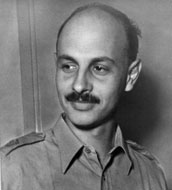Yigael Yadin
Yigael Yadin | |
|---|---|
 | |
| Allegiance | Haganah Israel Defence Forces |
| Years of service | 1932 - 1952 |
| Rank | Lieutenant General Chief of Staff |
| Battles/wars | World War II 1948 Arab-Israeli War |
Yigael Yadin (Hebrew: יגאל ידין, born Yigal Sukenik (Hebrew: יגאל סוקניק) on 21 March 1917, died 28 June 1984) was an Israeli archeologist, politician, and the second Chief of Staff of the Israel Defense Forces.
Biography
Early life and military career
Yadin was born in 1917 to noted archeologist Eleazar Sukenik and educationalist and women's rights actvist Hasya Feynsod Sukenik. He joined the Haganah at age fifteen and served there in a variety of different capacities. In 1946, however, he left the Haganah following an argument with its commander Yitzhak Sadeh over the inclusion of a machine gun as part of standard squad equipment. He was a university student when, in 1947, shortly before the State of Israel declared its independence, he was called back to active service by David Ben-Gurion. He was Head of Operations during Israel's War of Independence, and was responsible for many of the key decisions made during the course of that war.
Yadin was appointed Chief of Staff of the IDF on November 9, 1949, following the resignation of Yaakov Dori, and served in that capacity for three years. He resigned on December 7, 1952, over disagreements with then prime minister and defense minister David Ben-Gurion about cuts to the military budget. By age thirty-five, he had completed his military career.
Archaeology
Upon leaving the military, he devoted himself to research and began his life's work in archeology. In 1956 he received the Israel Prize for his doctoral thesis on the translation of the Dead Sea Scrolls. As an archeologist, he excavated some of the most important sites in the region, including the Qumran Caves, Masada, Hazor, and Tel Megiddo. He considered the Solomonic Gate at Tel Gezer to be the highpoint of his career. He was sometimes forced to deal with the theft of important artifacts, occasionally by prominent political and military figures. In one instance, where the thefts were commonly attributed to the famous one-eyed general Moshe Dayan, he remarked: "I know who did it, and I am not going to say who it is, but if I catch him, I'll poke out his other eye too."
Even as an archeologist, Yadin never completely abandoned public life. On the eve of the Six-Day War, he served as a military adviser to prime minister Levi Eshkol, and following the Yom Kippur War, he was a member of the Agranat Commission that investigated the actions that led to the war.
Political career
Template:MKs In 1976 Yadin formed the Democratic Movement for Change, commonly known by its Hebrew acronym Dash, together with Professor Amnon Rubinstein, Shmuel Tamir, Meir Amit, Meir Zorea, and many other prominent public figures. The new party seemed to be an ideal solution for many Israelis who were fed up with alleged corruption in the Alignment (the major party in Israel at the time), which included the Yadlin affair, the suicide of Housing Minister Avraham Ofer, and Leah Rabin's illegal dollar account in the United States. Furthermore, Dash was a response to the increasing sense of frustration and despair in the aftermath of the 1973 war, and the social and political developments that followed in its wake. Many people regarded Yadin, a warrior and a scholar, as the quintessential prototype of the ideal Israeli, untainted by corruption, who could lead the country on a new path.
In the 1977 elections, the new party did remarkably well for its first attempt to enter the Knesset, winning 15 of the 120 seats. As a result of the election, Likud party leader Menachem Begin was able to form a coalition with Dash, thereby excluding the left for the first time in Israel's history. As the new Deputy Prime Minister, Yadin played a pivotal role in many events that took place, particularly the contacts with Egypt, which eventually led to the signing of the Camp David Accords and the peace treaty between Israel and its neighbor. Nevertheless, Dash itself proved to be a failure, and the party broke up into numerous splinter factions; Yadin joined the Democratic Movement, but it too split up and he sat as an independent MK for the remainder of his term. He retired from politics in 1981.
Yadin was married to Carmela (nee [Ruppin]) who worked with him throughout his career in translating and editing his books and with whom he had two daughters - Orly and Littal. He died in 1984. The Israeli actor Yossi Yadin was his brother.
Works
- Masada: Herod’s Fortress and the Zealots’ Last Stand. New York: Random House, 1966.
- Hazor (Schweich Lectures for 1970)
Sources
- Neil A. Silberman "A Prophet from Amongst You: The Life of Yigael Yadin, Soldier, Scholar, and Mythmaker of Modern Israel" Addison Wesley (1994).
